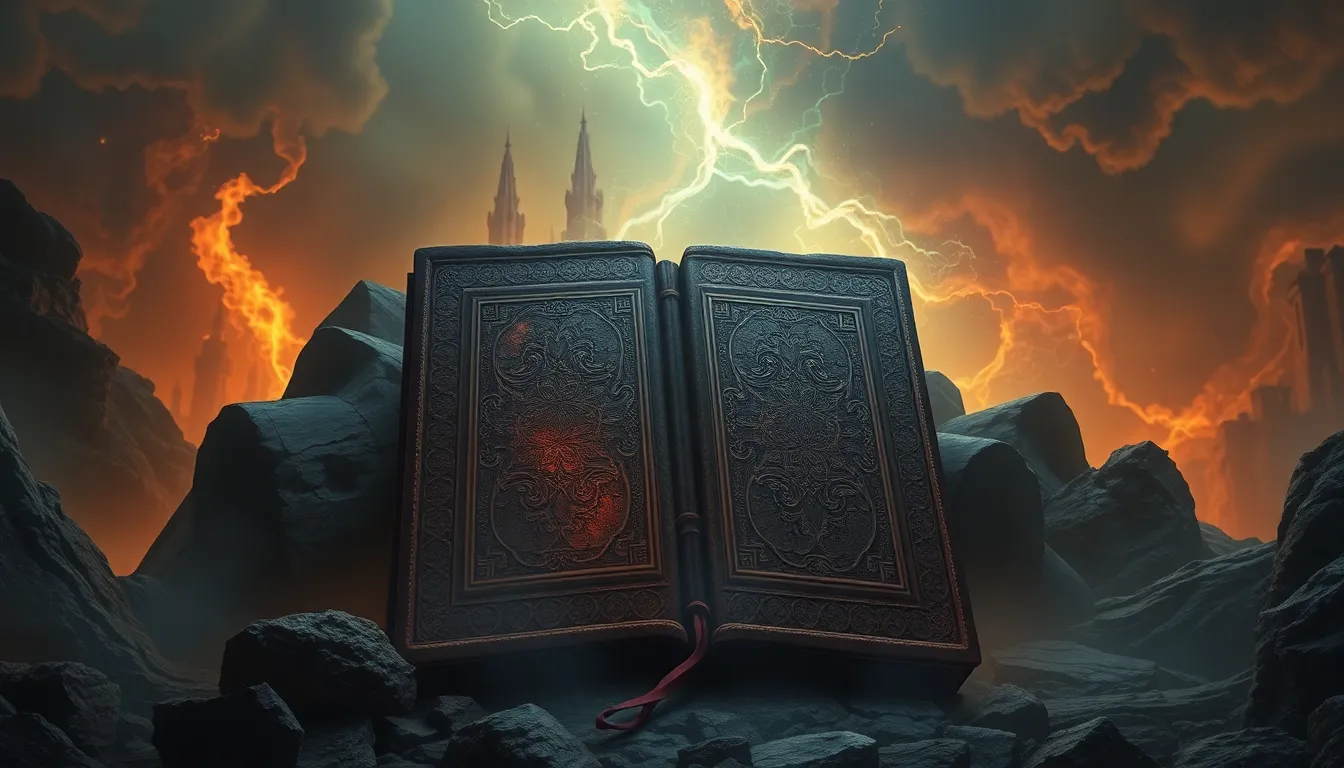The Enchanted Book: Secrets of the Ancient World
I. Introduction
The concept of enchanted books has long captivated the human imagination, appearing in various forms across literature and mythology. These texts often embody mystical qualities, promising knowledge, power, or even a glimpse into the divine. The importance of ancient texts lies not only in their literary merit but also in their ability to provide insight into the cultures that produced them.
This article aims to explore the secrets and significance of these ancient works, delving into their origins, mystical qualities, and the impact they continue to have on modern literature and society.
II. The Origins of Enchanted Books
Enchanted books are characterized by their magical elements and the power they bestow upon their readers. They often contain knowledge that transcends the ordinary, hinting at truths about life, death, and the universe.
The historical context of enchanted books can be traced back to early civilizations, where literary traditions were rooted in oral storytelling. These narratives laid the groundwork for written texts, allowing wisdom to be preserved and shared across generations.
A. Definition of Enchanted Books and Their Characteristics
- Magical elements that defy the laws of nature
- Powerful knowledge that can change the reader or the world
- Connection to the divine or supernatural forces
B. Historical Context: Early Civilizations and Their Literary Traditions
From ancient Mesopotamia to Egypt and beyond, early civilizations created literary works that reflected their beliefs, values, and understanding of the cosmos. These texts often served not only as entertainment but also as moral and ethical guides.
C. The Role of Oral Storytelling in the Creation of Written Texts
Oral storytelling was crucial in shaping the narratives that would later be inscribed in books. This tradition allowed for the evolution of stories, incorporating various cultural elements and making them accessible to a broader audience.
III. Notable Ancient Texts and Their Mystical Qualities
Several ancient texts stand out for their profound themes and mystical qualities, offering insights into the human experience.
A. The Epic of Gilgamesh: Themes of Immortality and Wisdom
The Epic of Gilgamesh, one of the earliest known works of literature, explores the quest for immortality and the wisdom gained through the acceptance of mortality. Its enchanting narrative intertwines friendship, loss, and the search for meaning.
B. The Book of the Dead: Egyptian Beliefs and the Afterlife
The Egyptian Book of the Dead serves as a guide for the deceased navigating the afterlife. Its spells and incantations reveal the Egyptians’ beliefs about death, resurrection, and the journey of the soul.
C. The Mahabharata: Mythical Elements and Moral Lessons
This epic narrative presents a rich tapestry of mythology, philosophy, and moral dilemmas. The Mahabharata offers a profound exploration of duty, righteousness, and the complexities of human nature.
IV. The Symbolism of Enchantment in Ancient Literature
Enchantment in ancient literature often symbolizes deeper truths and universal themes that resonate across cultures.
A. The Use of Magical Elements to Convey Deeper Truths
Magical elements in stories often serve as metaphors for real-life struggles and aspirations, allowing readers to engage with complex ideas in an accessible manner.
B. Cultural Interpretations of Enchantment Across Civilizations
Different cultures interpret enchantment uniquely, reflecting their values and beliefs. For example, while Western literature may focus on individual heroism, Eastern texts often emphasize harmony and collective duty.
C. The Relationship Between Magic, Knowledge, and Power
In many ancient texts, magic is closely tied to knowledge and power. Those who possess enchanted books often hold significant authority, symbolizing the link between wisdom and control over one’s destiny.
V. The Influence of Enchanted Books on Modern Literature
Ancient texts continue to inspire contemporary authors, shaping the landscape of modern literature.
A. How Ancient Texts Inspire Contemporary Authors
Writers draw upon the themes and archetypes found in ancient literature, infusing their works with the timeless allure of enchantment.
B. The Resurgence of Fantasy and Magical Realism in Modern Storytelling
Genres such as fantasy and magical realism have seen a resurgence, echoing the enchanting qualities of ancient narratives. Authors like J.K. Rowling and Gabriel García Márquez have crafted worlds steeped in magic and wonder, reminiscent of ancient texts.
C. Examples of Modern Works Influenced by Ancient Narratives
- Circe by Madeline Miller – Drawing from Greek mythology
- The Song of Achilles by Madeline Miller – A retelling of the Iliad
- American Gods by Neil Gaiman – Integrating ancient deities into modern life
VI. Secret Societies and the Preservation of Ancient Knowledge
Throughout history, secret societies have played a significant role in valuing and preserving ancient texts.
A. Overview of Secret Societies That Valued Ancient Texts
From the Rosicrucians to the Freemasons, various secret societies have sought to safeguard ancient wisdom, believing it holds the keys to enlightenment.
B. The Role of Scholars and Scribes in Safeguarding Knowledge
Scholars and scribes have historically been tasked with the preservation of texts, often facing challenges to maintain the integrity of the knowledge they guarded.
C. The Impact of the Printing Press on the Dissemination of Ancient Wisdom
The invention of the printing press revolutionized the accessibility of ancient texts, allowing for broader dissemination and the democratization of knowledge.
VII. The Quest for Lost Ancient Texts
The discovery of lost works can significantly enhance our understanding of history and culture.
A. The Significance of Discovering Lost Works
Lost texts often provide invaluable insights into the beliefs and practices of ancient civilizations, filling gaps in our historical knowledge.
B. Notable Discoveries (e.g., Dead Sea Scrolls, Nag Hammadi Library)
- The Dead Sea Scrolls – Ancient Jewish texts that shed light on early religious practices
- The Nag Hammadi Library – A collection of early Christian and Gnostic texts
C. The Ongoing Search for Ancient Manuscripts
Archaeologists and scholars continue to search for ancient manuscripts, driven by the belief that every discovery could unlock new understanding of our shared human heritage.
VIII. The Modern-Day Enchantment: Digital Age and Ancient Wisdom
The digital age has transformed how we access and interpret ancient texts.
A. How Technology Has Transformed Access to Ancient Texts
Digital archives and online databases have made ancient texts more accessible than ever, allowing scholars and the public to engage with these works.
B. The Role of Online Archives and Digital Libraries
- Project Gutenberg – Offers free access to thousands of literary works
- The Internet Archive – A vast repository of texts, images, and media
C. The Potential for New Interpretations Through Digital Mediums
Digital platforms allow for innovative interpretations of ancient texts, fostering new discussions and insights that may not have emerged in traditional formats.
IX. The Philosophical Implications of Ancient Enchantment
Ancient texts provoke essential philosophical questions about knowledge, belief, and ethics.
A. Exploration of Knowledge Versus Belief in Ancient Texts
The dichotomy between knowledge and belief in ancient texts raises questions about the nature of truth and the role of personal interpretation.
B. Ethical Considerations: The Consequences of Misinterpretation
Misinterpretation of ancient texts can lead to significant cultural misunderstandings and ethical dilemmas, highlighting the importance of context in interpretation.
C. The Relevance of Ancient Wisdom in Contemporary Society
Ancient wisdom continues to resonate today, offering guidance on moral dilemmas and human experiences that transcend time.
X. Conclusion
In conclusion, the exploration of enchanted books and their secrets reveals a profound connection between ancient wisdom and modern society. These texts not only serve as




